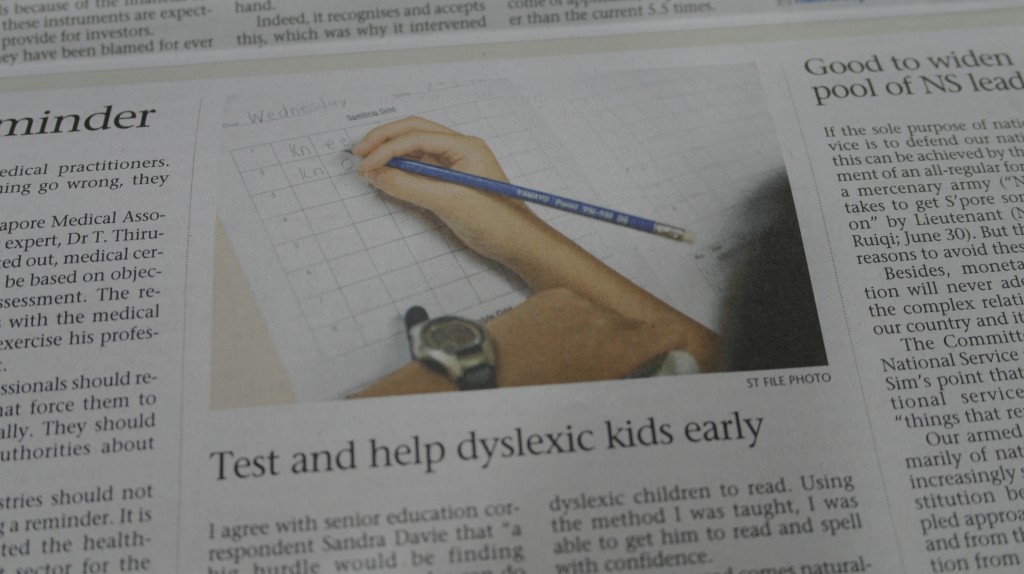Test and help dyslexic kids early (full version)
Last Sunday, Ms Sandra Davie wrote an article titled “Master reading, maths early for a good start in life”
I wrote a letter in response to it, and my letter was published in today’s Sunday Times “Test and help dyslexic kids early”. (I will include the link when it is available)
It was edited and there were some points that were not reflected. I am publishing my full letter here, with those parts highlighted in bold below:-
—————————————————————————————————————————————————————
I refer to Ms Sandra Davie’s article on “Master reading, maths early for a good start in life” on 7 July 2013 (The Sunday Times).
I agree with her statement that “a big hurdle would be finding pre-school educators who can do reading intervention programme”.
My son could not read at K2. His kindergarten teachers did not flag him out for any intervention – they just said that he learns slowly. I decided to send him for assessment at KKH anyway. He was assessed by KKH to be ready for Primary school. However, he was recommended for referral to the Dyslexic Association of Singapore (DAS), but I had to separately write in to DAS. It was only after 6 months, that DAS called me, but my son has yet to begin any therapy with them. He is now in Primary 1, and despite being on the school’s Learning Support Programme and Buddy Reading programme, he is still unable to read fluently, nor spell. He could hardly pass each spelling test, not to say his class tests. Much of his school work had to be completed at home with my guidance.
I enrolled myself for a course to teach dyslexic children to read, using the Orton-Gillingham method. I started teaching him in the last one over month, and for the first time in many years, he is starting to read and spell with confidence. Learning to read comes naturally to normal children, but for dyslexic children, they will only learn if they are taught to read. Going for phonics classes is not the same as teaching the child to read. I teach my son by breaking the English language down, analysing and explicitly explaining it to him, and helping him put it all together again. It is diagnostic in nature, specific to his need, and there is much scaffolding to ensure that his foundation is firm on the one hand, and he is able to progress on the other. My son used to read haltingly, but he could not spell, and there would be “bad” days when he seemed to have forgotten everything I have taught him. But now, he does not exhibit the “bad” days symptoms anymore. He is still learning to be fluent in his reading, but he reads with a confidence that comes from true knowledge.
In my journey of finding a way to help my son, I met many parents like myself. We want to help our children, but we do not know how. Many of them suspect that there is something different about their children, but teachers, friends, relatives and even spouses dismiss their concerns. Some of them sought help despite objections, and they were glad they did so.
My concerns are for children whose parents have yet to find the way to help their children, and from my own experience and from talking to parents, I do not think that our educators are trained and equipped firstly to detect children with issues like dyslexia, and secondly, to do reading intervention. This lack of expertise occurs both at the pre-school and primary school level.
The reason we want to detect early is so that intervention can start early, especially before they enter into primary one. Previously, I did not believe in early detection because I did not think there was an effective intervention method for my son. Now I know otherwise, and I encourage parents to go for testing, and look for a method that can really help your child. It does exist.
Until such time when our education system is able to build that capability to a level and to the extent that matches the needs, parents will have to source for the solution for their children on their own.


Very telling, the portions they omitted. Clearly there’s a no one must be implicated policy.
Glad you found a way to help him. As with all such matters, it’s always those less fortunate who will not have access to early intervention.
Hi there…chance abt your post as currently I am at this crossroads and trying to help my k2 girl overcome her handicap in reading n writing. Im not entirely sure what to do but your post did gave me the courage to persevere this journey. Im going directly to das for help, hopefully the wait is shorter and I can help my girl experience the first taste taste if success in reading soon
Hi Rei
Thks for your comments. I am sorry I was quite swarmed.. your girl is blessed to have your to walk with her. It is a long journey, but it is important to keep her spirits high. It is tough because many of them are really bright kids, and their dyslexia both puzzle and frustrate them to no end. Keep encouraging her. Her struggles now as a dyslexic reader will serve her well when she meets challenges later in life. She won’t give up easily cos she would have learned to fight since young. 🙂